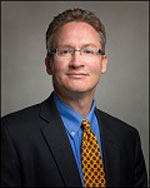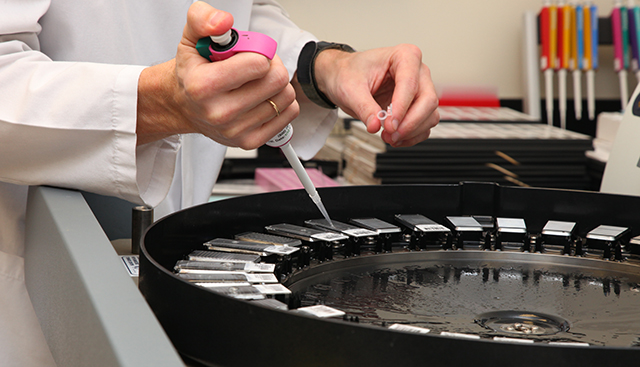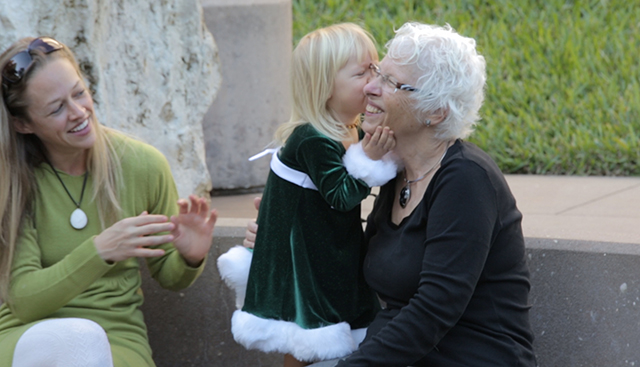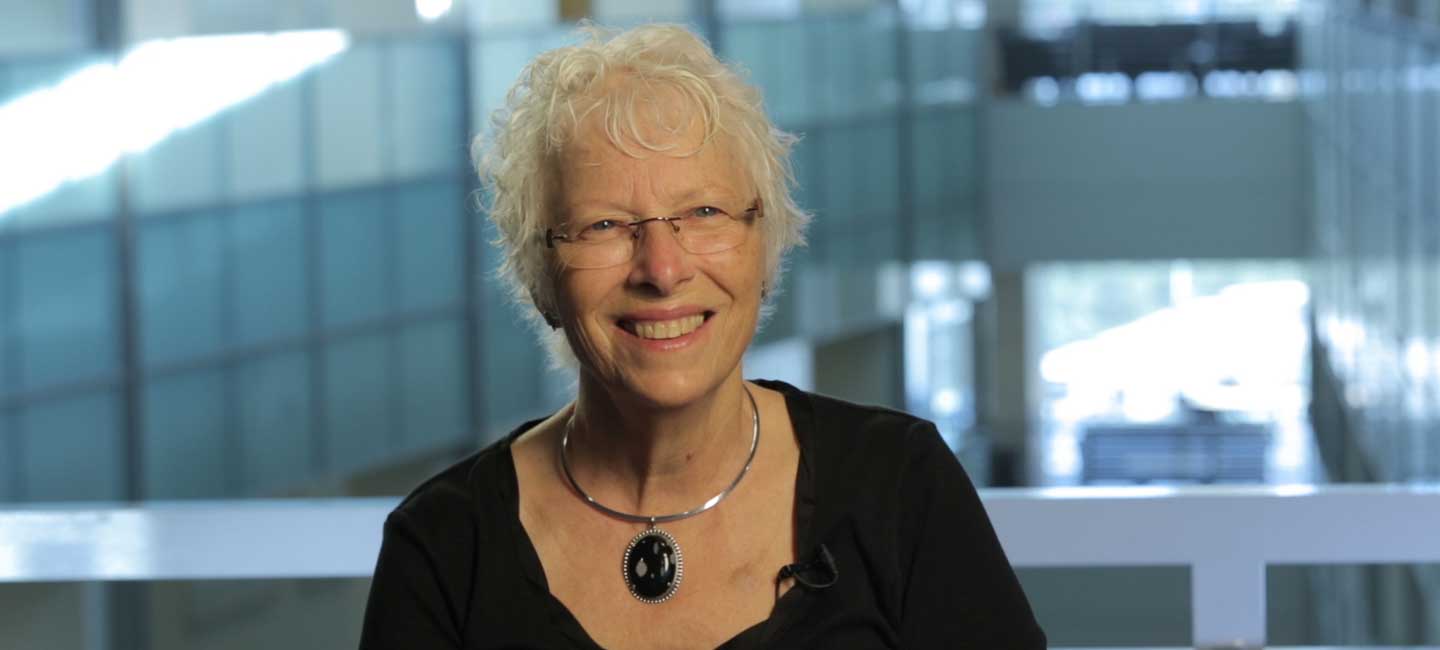Saving Lives After Death
You could call Gail Porter the queen of clinical trials.
The retired special education teacher was diagnosed with inoperable stage 4 lung cancer in 2010, and began what would be almost a decade of treatment. Her first round of chemotherapy only kept the cancer at bay for five months; she stopped her second round early because of harsh side effects.

Dr. Eric Haura, director, Moffitt Lung Cancer Center of Excellence.
When her oncologist, Dr. Eric Haura, sent her tumors to a lab for genetic analysis, they learned she had a rare aggressive form of cancer Porter likens to the Energizer Bunny. The good news was there was a drug that targeted that specific genetic mutation. Porter responded well to the treatment for almost two years, but when the side effects became too much to handle, she decided to stop.
It became a revolving door for Porter—she would be placed in a new clinical trial for a new therapy. Sometimes the drugs would work for months, sometimes years. But there were always intense side effects that would force Porter to switch to something new. She has participated in eight different clinical trials. Then in 2018, debilitating headaches relating to her treatment threatened a once-in-a-lifetime trip to Europe. Porter made the decision to stop taking the medication so she could enjoy her travels; she would decide what to do when she got back.
“When I returned I just couldn’t restart,” said Porter. “I was just emotionally and physically done and I wanted to be in charge of my life.”
In September 2018, Porter decided to stop treatment.
Ethical No Man’s Land
Groundbreaking research in the last decade has given rise to evolving treatments like immunotherapies and targeted therapies. This has been done by studying tumors grown in a laboratory and cancers surgically removed from patients. “However, that’s not the same cancer that medical oncologists are dealing with in clinic after people have received chemotherapy, immunotherapy or targeted therapy and failed,” said Haura. “Those cancers have evolved mechanisms to thwart drugs.”

A researcher prepares samples in the lab.
To study those types of cancer, researchers would need to access tumor tissue from patients, like Porter, with advanced cancers who have received modern treatment. It would enable scientists to better understand what the disease looks like after a patient has taken multiple different types of drugs and to see how metastatic tumors differ in different areas of the body. The catch was these samples could only be collected in a small window of time after a patient passed away.
Moffitt Cancer Center researchers understood the benefits of collecting this type of tumor tissue, but were faced with a big challenge: when and how to ask patients to be involved.
“The problem is that this put physicians like me in an ethical no man’s land where if you’re coming to me for your care, having discussions about tumor tissue donation upon your death is a difficult conversation,” said Haura. “We realized we needed to do some due diligence on the ethics about this and understanding what patients and other people thought.”
A team of medical oncologists, pathologists, cancer epidemiologists and behavioral researchers spent years talking to physicians, patients, family members and advocacy groups about what is called rapid tissue donation for lung cancer. The goal was to create guidelines to conduct conversations about donation in a respectful way and minimize disruption to the family after one of their loved ones dies. Ideally, a medical examiner would go to the funeral home and collect the sample within 24 hours of death.
For Haura, the hardest part was drafting ways to have the initial conversation with patients and their families. “For me, this is talking about someone’s mortality,” said Haura. “You would think if you’re in an oncology clinic that this is a routine conversation, but patients have different feelings about this. Some people want incredible detail or predictions about their mortality and others don’t.”
It was also important to make sure at least one family member was involved, to make sure not only the patient had support, but to also ensure all of the patient’s wishes were known. Haura learned he would have to select the patients he asked to enroll in the program in a “smart” way; he focused on patients who he had built a very strong, trusting relationship with patients like Porter.
“At first Dr. Haura said, ‘Gail, I need your help,’” said Porter. “He told me, ‘We have this new program and I don’t know how to present it to a patient because I don’t want to take away their hope.’”
Porter asked to think about it, and at her next appointment a few weeks later offered her suggestions. She then became the first patient to enroll in the rapid tissue donation program. “For me, it just made sense,” she said. “I get a chance to still teach. They are going to take my tissue and learn something that will help the next person down the road.”
Putting the Pieces Together
Since Porter became patient number one, 24 others have enrolled. The team has collected tissue from 10 individuals, amounting to more than 200 samples that are already showing promising results. Researchers have been able to identify a potential reason why a certain targeted therapy failed in a patient and are one step closer to understanding the role of the immune system in advanced cancers. “The quality of samples has proved to be outstanding so now people can have confidence that this material is going to be useful,” said Haura.
Now that the ethical framework has been established and patients are being enrolled, the next step is growing the program. Haura says they need hundreds more tissue samples treated with different therapies to be able to start establishing patterns. Looking even more forward into the future, the program has the possibility to expand to other cancer types or even lead to partnerships with other institutions.
An Incredible Gift
On Saturday, April 6, 2019 Porter’s daughter, Celia Merritt, climbed the 42 stories of the Bank of America Plaza in downtown Tampa. She’s participated in the Fight for Air Climb to support the Lung Cancer Association for the past eight years, but this year was different.
For the first time, her mom was not waiting for her at the finish line. Porter passed away peacefully and surrounded by family the evening of April 4, 2019.

Gail Porter with daughter Celia and granddaughter Rylee.
As fate would have it, at the same time Merritt tackled the 914 steps, a medical examiner was collecting Porter’s tissue samples. Merritt says she and her family are at peace knowing her mom’s wishes have come true.
At the end of the day, she was so excited to be the first person to sign up for the rapid tissue donation program and she wanted others to not be scared of it,” said Merritt.
“There’s plenty of things to fear, but when you’re talking about advanced cancer there are worse things than death and she wanted to help make the process of living easier for other people.”
New research and clinical trials gave Porter more than eight extra years with her family, and Merritt says knowing she could help others do the same gave her mom hope throughout her journey.
“There’s one thing she wanted to make very clear: you lose your battle if the doctors tell you about your cancer and you go home and give up. That’s losing,” said Merritt. “But to pass away from cancer or fail out of a trial—she never felt like she lost because she always had so much support and was always working towards having more options for others in the future.”
Merritt says the tissue donation process went very smoothly. A representative from Moffitt double checked with the family to make sure they still consented to the donation and coordinated with hospice and the funeral home. The following Monday, Merritt got a call from Haura who let her know that the donation went well and the team was going to be able to do a lot with Porter’s samples. “For them to be able to learn from my mom’s last eight years is just so big,” said Merritt.
While Porter’s physical cancer fight may be over, her journey is far from ending. Researchers are just beginning to unlock all the knowledge she left behind. Porter has become part of the team’s drive to continue pushing for answers, her words a constant reminder of the incredible selfless woman who inspired others to never give up hope:
“There’s so many people with cancer and if donating a piece of me helps one of them live even just one year longer, that’s an incredible gift.”



